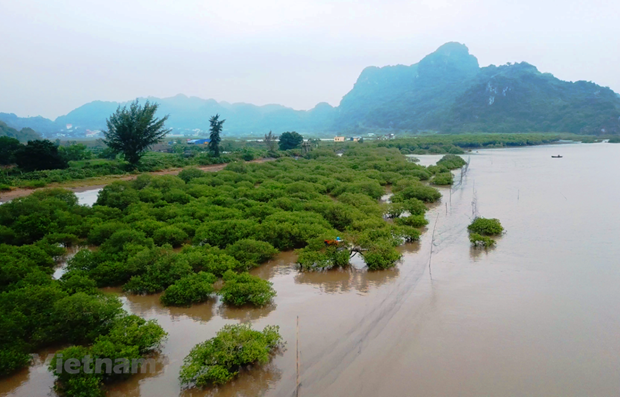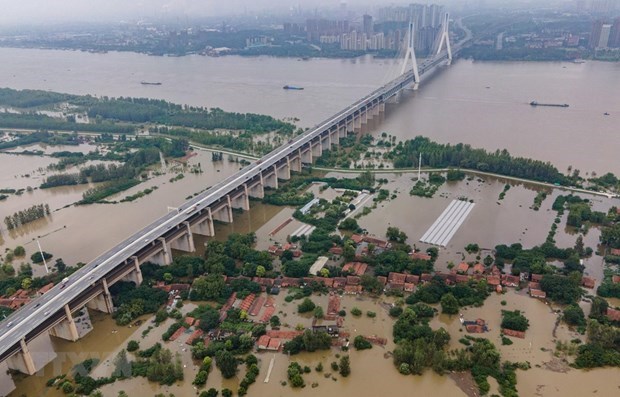Vietnam’s green transition roadmap serves to fight climate change
 Illustrative photo (Source: Vietnam+)
Illustrative photo (Source: Vietnam+)Hanoi (VNA) - Vietnam needs to establish a green transition roadmap as well as transparent mechanisms and policies to monitor public and private financial flows to support the implementation of "green" investment projects.
Given that climate change is an irreversible trend, the biggest challenge for humanity are climate change adaptation and net zero emissions. These two aspects are an opportunity for sustainable development. According to experts, Vietnam needs to establish a roadmap for "green transformation" to achieve the goal of sustainable development.
Addressing a conference in Hanoi on April 26 to collect ideas on the draft national strategy on climate change until 2050, Deputy Minister of Natural Resources and Environment Le Cong Thanh said that the strategy comprises viewpoints and solutions that are suitable to the country’s commitments at the 26th UN Climate Change Conference of the Parties (COP26) as well as requirements of Paris Agreement.
The event was held by the Ministry of Natural Resources and Environment (MoNRE) in coordination with the UN Development Programme (UNDP) and the German Agency for International Cooperation (GIZ).
Thanh underlined that the strategy clarifies the roadmap to realise Vietnam’s commitments at COP26, as well as solutions that the country works out to reach the target of bringing net emissions to zero by 2050.
He expressed his hope that international organisations and development partners will continue to support Vietnam during the implementation of the strategy, the nationally determined contribution (NDC) as well as solutions to realise the country’s commitments at COP26.
 Vietnam needs to actively adapt to climate change. (Photo: VNA)
Vietnam needs to actively adapt to climate change. (Photo: VNA)Caitlin Wiesen, UNDP Resident Representative in Vietnam, said that she hopes the long-term strategy will create a widespread and sustainable foundation for other important climate change related plans and policies.
She recommended that Vietnam build a coherent climate change law and speed up the implementation of adaptation measures, thus strengthening the resilience of the society. This applies especially to communities that are directly impacted by climate change. It is necessary to build a green and fair transition roadmap as well as transparent policies to follow public and private financial flows to support the implementation of green investment projects and programmes, she said.
The UNDP has actively supported local communities with transformational projects where co-benefits of climate actions are optimal. With the Green Climate Fund and Global Environment Facility finance, the planting and regenerating of 4,000ha of coastal mangroves is possible, along with over 4,000 new resilient houses.
Meanwhile, Weert Börner, Chargé d'affaires of the German Embassy in Hanoi said that the strategy will make an important contribution to the national discussions on net-zero emissions. He added that the discussions should be continued after the strategy is approved by the PM in 2022.
He affirmed that the German Government is determined to continue supporting Vietnam in conducting necessary transformation process to reach net-zero emissions in a fair and sustainable way.
The draft national strategy on climate change until 2050 aims to strengthen the country’s capacity to adapt to climate change. It also aims to reduce the vulnerability and losses caused by climate change, and complete the target of net-zero emissions. The plan serves to make use of opportunities to speed up the transformation of the growth model, enhance the competitiveness of the economy, and make positive contributions to international efforts in preventing climate change.
To this end, the strategy gives a number of solutions, including developing infrastructure to serve climate change adaptation, and completing institutions and optimising resources for climate change response.
Climate change adaptation and reducing greenhouse gas emissions are two key objectives of the national strategy.
Vietnam is aiming to reduce the total national greenhouse gas emissions by 43.1 per cent, compared to the normal operations./.













